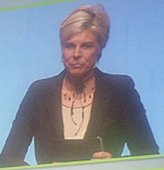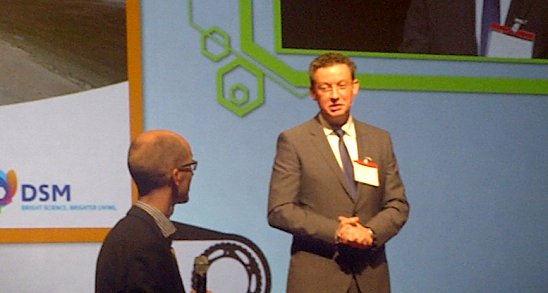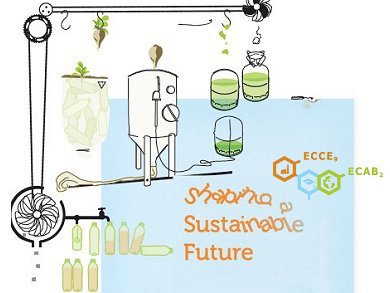The ECCE9/ECAB2 congress ‘Shaping a Sustainable Future’ was held last week at the World Forum in the Hague, the Netherlands. The diverse and innovative 5-day program offered researchers, scientists, engineers, industrial professionals, entrepreneurs and students to exchange and share their experiences, new ideas, and research results on all aspects of chemical engineering, applied biotechnology, and process intensification.
Opening Ceremony
The conference started with the opening ceremony on Sunday, April 21st. After an impressive video animation and drumming presentation (left picture below), the presidents of the supporting organizations together gave the first presentation. Professor Richard Darton (pictured, right), University of Oxford, UK, and President of the European Federation of Chemical Engineering (EFCE), spoke about the EFCE being founded 60 years ago by 18 European technical and scientific societies. They joined together to advance the discipline of chemical engineering at a time when Europe till was split. Now there are 39 societies from 30 countries within EFCE.

Professors Guilherme Matos Ferreira (pictured, left), University of the Algarve, Portugal, and President of the European Society of Biochemical Engineering and Science (ESBES), said that after the great success of their joint congress two years ago in Berlin, Germany, ESBES and EFCE will continue to join forces at this conference and bring Industrial Biotechnology into the field of EFCE.
Mirroring the theme of the conference, Shaping a Sustainable Future – a partnership of academia, industry, and society, the opening ceremony looked at Chemical Engineering and Biotechnology from university, industry, and society perspectives.
Academia
Professors Richard Darton and Guilherme Matos Ferreira, spoke about how the need for change is everywhere, especially if we wish to address the challenges of the world. One constant, however, is that we will always need educated people and university research will be needed to provide ideas. However, universities will need to change as, for example, students become more mobile.
Industry
A round table discussion with CEOs of Dutch companies, including Atzo Nicolaï, director of DSM, Sjaak Remmerswaal, CEO of Bronswerk Heat Transfer, Gerald Schotman, CTO of Shell, Marc van Heyningen, Vice President of Fluor, and Chris Buijink, Secretary-General of the Ministry of Economic Affairs, addressed sustainability, innovation, and the industry’s commitment to a sustainable future.
Following this, young scientists from Dutch companies were invited to present their vision for their companies in 2050 in 2-minute slots. One idea was the use of “un-manufacturing”, a process by which every product can be disassembled into its building blocks that can then be recycled or reused to again produce high-quality products.
Society

Princess Laurentien van Oranje of the Netherlands (pictured) and founder of the Missing Chapter Foundation, underlined in her speach the importance of involving future generations in decisions being made now. She spoke about the work of the Foundation in building bridges between 8–12 year old children and decision-makers. She explained that children have particularly interesting ideas when looking at a company’s dilemma and can immediately discover weaknesses and visualize solutions more easily than adults. She heard from children that the word “innovation” is cold and “sharing” instead would a better word as it is only when you have shared your idea that you can make something of it.
When we think about the future we are talking about the now by saying we need to meet the needs of today without compromising the needs for tomorrow. If the future would be our defining point, we would ask what the decisions are that we need to make today in order to reach that future.
The Dieter Behrens Medal 2013 awarded by the EFCE was presented to Professor Sebastião Feyo de Azevedo, University of Porto, Portugal, during the opening ceremony.
Plenary and Prize Lectures
Each day of the meeting included a plenary talk. Monday’s plenary lecture by Peter Vadasz, Mayor of Güssing, and Professor Hermann Hofbauer, University of Vienna, both Austria, described the innovative and very successful processes for biomass conversion to provide electricity, district heating, and diesel fuel for the village of Güssing, Austria. They also looked at the partnership required between society and academia for developing technologies, and how such a partnership takes shape.
Tuesday’s lecture was on sustainable solutions for a changing world by Marcel Wubbolts (pictured, right), Chief Technology Officer DSM, the Netherlands.

The Danckwerts Memorial Lecture was also held on Tuesday. It is held in honor of Peter V. Danckwets, University of Cambridge, UK, past president of the Institution of Chemical Engineers (IChemE), and leading researcher in the field of chemical engineering. This year, it was delivered by Professor Sharon Glotzer, University of Michigan, USA. Her talk was titled ‘Assembly Engineering: Materials Design for the 21st Century’ in which she focused on the core principles of assembly engineering and the application of these to next generation materials, such as the self-assembly of nanoscale systems.
In Wednesday’s plenary lecture Professor Bernhardt L. Trout, MIT, Cambridge, USA, stated that the current approach to pharmaceutical development and manufacturing is unsustainable. With more knowledge-based approaches and continuous manufacturing he hopes to replace the trial and error experimentation and batch processing. However, changes in mindset and in administrative structure are also required.
In the final plenary lecture, Professor Kai Sundmacher, Max Planck Institute for Dynamics of Complex Technical Systems & Otto-von-Guericke University, Magdeburg, Germany, spoke about what the future toolbox for chemical process design will have to look like to enable chemical engineering to contribute solutions to the extremely challenging problems that our society is facing. Instead of building processes from existing libraries of materials and devices, chemical engineers have to solve the design task as a multiscale decision procedure. For this they have to take under consideration all degrees of freedom available at the different process levels.
Innovation is an Opportunity for Change
Throughout the conference, a session called Innovation Track offered workshops, forums, and talks such as Early Stage Business Planning and Value Based Pricing to stimmulate innovative thinking.
Innovative also was the concept of the conference to start the sessions with music and video animations or short videos summarizing the previous day, or to have a moderator who lively commented the presentations, took questions from the auditorium and asked the participants how they liked the presentation.
Networking and matchmaking sessions as well as many coffee brakes gave people plenty of opportunity to meet, exchange ideas, brainstorm solutions, and discover new potential partnerships.

The conference ended with visits to local companies, including Fluor, Haarlem, AkzoNobel, Sassenheim, Shell, Port of Rotterdam, and the Bioprocess Pilot Facility, Delft.
The next joint conference, ECCE10/ECAB3, will take place in Nice, France, from September 26 – October 1, 2015.
- News: Dieter Behrens Medal for S. Feyo de Azevedo
- Event: 21st International Congress of Chemical and Process Engineering CHISA 2014



